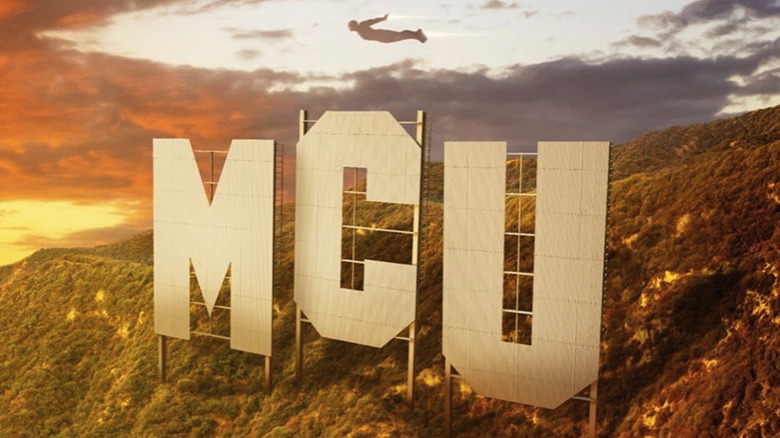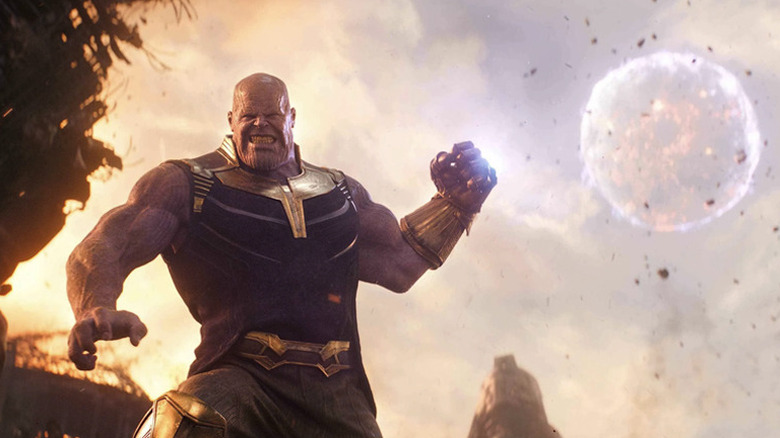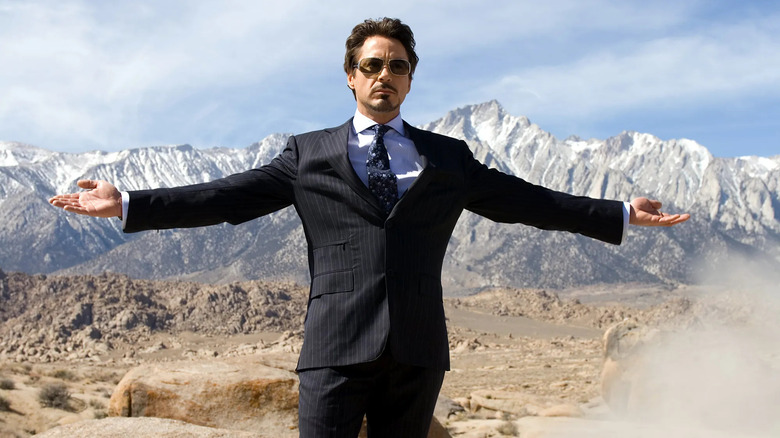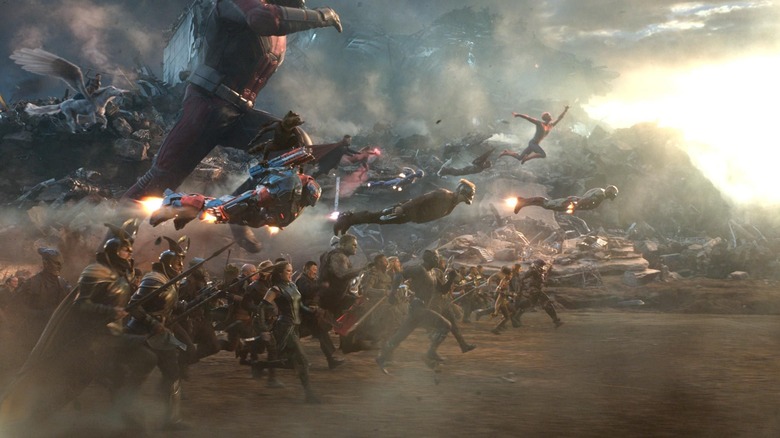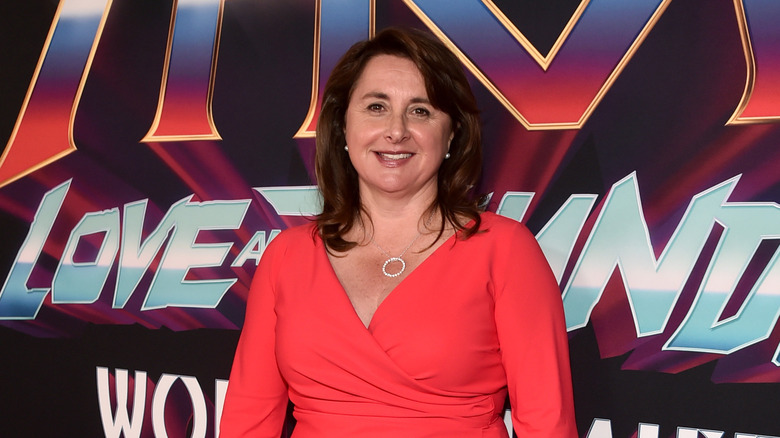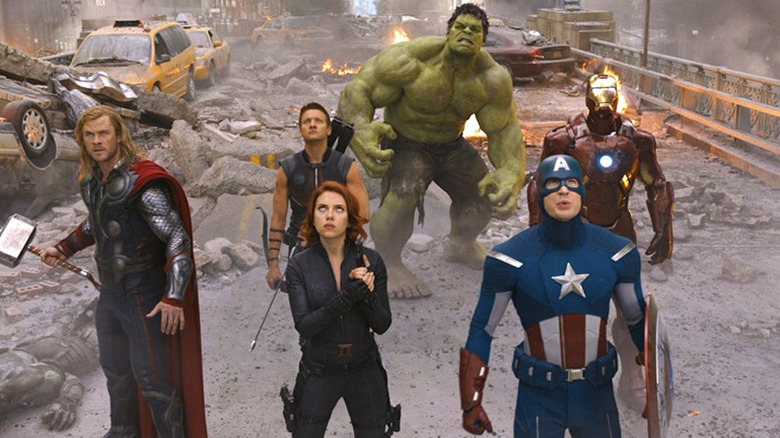MCU Authors On Crafting The Definitive Marvel Studios History And How The MCU Can Bounce Back [Exclusive Interview]
If you're a longtime /Film reader, you might think you know the history of Marvel Studios. After all, this site has been around since 2005, so in some ways, our archives double as a real-time history of the rise of this improbable pop culture juggernaut, which exploded onto the scene with 2008's "Iron Man" and became the dominant brand in Hollywood.
But even if you've been following along with us since the beginning, and even if you read Marvel Studios' own authorized history that was published in 2021, you won't get the full story until you read "MCU: The Reign of Marvel Studios." The book, which hits shelves on October 10, reveals behind-the-scenes stories you've never heard (one involves businessmen sprinting through the streets of New York City to make a last-second deal) and traces the arcs of notable figures like Kevin Feige, Ike Perlmutter, Avi Arad, Victoria Alonso, and Lou D'Esposito as Marvel Entertainment goes from a waning toymaker to one of the biggest entertainment forces on the planet.
"As we were writing the book, I kept asking the question, 'Who is this book for?'" co-author Joanna Robinson told me during a July interview with her and co-authors Dave Gonzales and Gavin Edwards. "And everyone kept going, 'Well, it's for everyone.' That's ultimately where we tried to land, which is it's for enthusiastic fans, it's for skeptics, it's for people being like, 'How did these superheroes infest Hollywood?' Or it's for people wondering, when this book comes out in October, sitting there thinking, 'What happened to Marvel, this studio that I loved so much? What's going on?' We're hoping to answer that as well, which I think we did."
The result is an incredibly enjoyable read which puts in stark (hah!) context just how unlikely it was that this company set a template the rest of Hollywood would spend billions of dollars attempting to emulate. In my conversation with the authors, Robinson, Gonzales, and Edwards spoke about how they tackled such an immense subject, the biggest revelations they learned while writing the book, what Marvel Studios needs to do in order to get back on track, and more.
Note: This interview has been lightly edited for clarity and brevity.
'I think we were able to tell a more realistic and wide-scoped version of that story'
In the opening pages of this book, you guys talk about how Disney initially seemed cool with you all writing the book, and then you heard that people were being asked not to speak with you about it. So I'm wondering, Dave, can you talk me through your reaction to that?
Gonzales: Yeah, Joanna and I, when we started this project around the "Endgame" release, [we] were very bullish by what we were hearing back from Disney itself and some people inside of Marvel that there was a possibility to get everyone. I think if we didn't feel like that was possible, we would've approached the project in a different way, but we decided to go off, do that, and luckily, being it was 2019 — or I guess unluckily — the pandemic hit fairly soon, and a lot of people who were on different production schedules and maybe were difficult to get ahold of, started opening up to talk to Joanna. So we got a whole bunch of influx with that, and it was great, until we were talking to somebody in the [visual development] department. And a couple of hours after that interview finished, someone from Marvel reached out and asked if we could strike that interview.
And we were like, "Well, it's been logged. So unfortunately, no." That was sort of the beginning of us starting to get some responses from people that were like, "We'd love to talk to you, but..." and that's sort of when the door began to shut on us and we felt it. And it wasn't so much like Marvel or Disney ever reached out and said, "Please stop doing this." But it was that what were a whole bunch of open doors, either because somebody way high up the ladder realized what was going on, or because I think there's a possibility they restarted their own making-of book during the pandemic, that the combination of those things meant that it wasn't beneficial for them to have a competing narrative out there at that time. The process of writing this book ended up taking the entire production run of their very nice coffee table book that tells a similar story. And I think we were able to tell a more realistic and wide-scoped version of that story, ultimately, because we just tried to get the actual story from everybody rather than basing a lot of our reporting off of the official line that we would've gotten from people really early on.
'When you dig into how it was made, it's a miracle'
I'm wondering for all of you, what were the biggest revelations that you learned when putting this book together? I know that you've been paying close attention to this stuff for a long time. I guess, were there any big revelations? Gavin, let's start with you.
Edwards: The thing that always fascinated me as I was working on the book was just the story of Marvel Studios in China. I had not realized that they, among other things, had perfect timing. That just as the Chinese market opened up to Western movies, that's as the MCU launches, and it was in the sweet spot of it was foreign and exotic, but not so unfamiliar that people couldn't understand it. And then they had this huge advantage over say, "Star Wars" comes in, the legacy movies are decades before, you haven't necessarily seen them in China, but you see the whole thing roll out.
And then learning what a huge part of the box office it was globally for Marvel, and then where they get to loggerheads and the extent to which Marvel really had to base itself in efforts to get back into China when China locked them out. So that was a story that I think I, like many people, had heard little pieces of, but then realizing when you put it all together, it tells the story of this growth that mirrors the overall story we're telling. That was fascinating for me.
Joanna, what about you?
Robinson: I think it comes down to a lot of, as you say, we knew a lot of the broader beats of this story, but it comes down to the hundreds of interviews that we did around this book and the little stories that we got that fleshed out those bigger story beats into understanding why things turned left and right the way they did on this path by the story of the very interesting personalities that were involved in every step along the way. I think one of the biggest "wow" stories for me was just how improbable it is that the first "Iron Man" came together at all/was a hit. All of the people we talked to on that movie described the incredible amount of chaos and just sort of indie movie, fly by night approach to this movie that, at the end of the day, stands as one of the most important and impressive blockbusters of all time, but when you dig into how it was made, it's a miracle.
Then also, a lot of the business stuff in the early days I wasn't as familiar with, and being able to talk to all the people who were there. Again, these are near impossible deals that were made in strange locations that involve running through the streets or lunch in Mar-a-Lago, or whatever the case may be. And all of that just seems, when you put it all together — and again, we think that coffee table book that Disney put out of their own story is a beautiful thing for fans to have. There's so much more to the story that they are either not interested in or not willing to tell that I feel like we capture in our book. And I think it adds more excitement and depth to a story that a lot of people might think they're very familiar with.
Yeah, the stuff about the businessmen running through the streets was just such a fantastic image to have in my head thinking about this stuff. Dave, did you have a revelation that you discovered?
Gonzales: I've been covering the MCU since its inception as geek press and on the Internet [as a] fan first, so I had a really rigid idea going into this project about what I thought it was going to be, and just how much I was focusing on the wrong thing. Everything that Joanna outlined was incredibly interesting and that's why it became the story. But as a geek journalist going into the first thing, I'm like, "Oh, I wonder if this rumor I heard was true. I wonder if this rumor I heard was true." What I found out is the way Marvel Creative works, they were all part of some sort of meeting at some point. Every sort of "leak" that we got had some sort of basis in reality. But that's actually the least interesting thing, because Marvel has such a rich history from comics and then a whole bunch of really smart movie people at the top of it that a small thing like, "Was Mephisto ever in 'WandaVision?'" actually was less interesting than how "WandaVision" went to become the debut on Disney+, and that entire story, as we're now seeing that industry collapse, and how Marvel jumped on it and had some early successes that led into I think just a glut of maybe too much product.
So I really went through my own personal journey with the studio and the media that it puts out. Because when it started, I was just happy to see some geek comic book properties brought to screen and being appreciated for what they were. And now, I'm even more in awe of how they could take what could be pieces that don't fit in the same puzzle and yet weave it into a gigantic tapestry.
'Can we have a mid-credit scene? Can we have a chapter in the middle of the notes?'
Joanna, I know that you've interviewed Kevin Feige a handful of times over the years, including for a Vanity Fair cover story that you worked on. I'm wondering if you had a chance to speak with him again specifically for this book?
Robinson: Nothing specifically for this book. The chat that I got to have with him for the VF cover story was really helpful because only a tiny fraction of that made it into the cover story, and I got to spend multiple hours with him in his office. So there was just a lot of untapped potential there. Then I did talk to him when I was covering "WandaVision" or whatever, I was writing the book simultaneously. So I was able to ask him some questions in other interviews that I had with him that pertained to what I wanted to cover in the book as well.
I've never written a book, but I've put together a handful of oral histories, including one about the final battle in "Avengers: Endgame" that you guys cited in your book, which was really cool for me to see.
Edwards: We did! Great work. That was amazing!
Thank you! The reason I bring that up is because sometimes when you're putting something like that together, there tends to be a story or two that's really good, but it just doesn't fit anywhere in the narrative that you're trying to tell. So I'm wondering if that happened to you here. You spoke with so many people. I was curious if there were any interesting stories to you that just didn't quite fit the narrative that you were trying to tell with this book.
Gonzales: Really early on in the process, I was like, "Can we have a mid-credit scene? Can we have a chapter in the middle of the notes?" And we successfully did that with one of those stories that you're talking about where we just heard it and we're like, "I would love for more people to know about this," but there wasn't really a good place to put it without it sort of seeming like a left turn from the subjects we were focusing on. So we get to have a mid-credit scene, which I appreciate thematically.
That's awesome. Yeah, I won't spoil that here. I'll leave that for the readers to discover. That's great. But speaking about the end of the book, actually, one thing I was really blown away by was that the notes section at the end contains just an absolute mountain of citations. There has been so much writing about Marvel Studios over the past 15 years, and it must have just been a gargantuan effort to comb through all of the potential sources for the chapters that you guys were working on, let alone to actually drill down on the actual quotes that you needed. So what was the process like for the three of you of going through that? How did you divide that workload up?
Robinson: So this is where, I mean, Dave and I talked about the beginning of this project, but the project doesn't really come together until we bring Gavin on. So I just want to make sure, as we have been everywhere, we sing Gavin's praises on this project. Because I would say in most basic terms, the way it breaks down is that I did all the interviews, Dave did a lion's share of the research, and Gavin made everything actually effing work, which it wasn't before. He gave us flow. Gavin also did a lot of research. I did some research, blah, blah. But I would say the person combing through the archives for the most part is Dave Gonzales, impressively, and also sort of captaining the notes section. But in terms of plucking out what feels essential to telling the story and what feels the most fun in the way to tell the story, I think that's a Gavin special. Absolutely.
Edwards: But I'll say that as I was working on the manuscript, it was like Dave was my gigantic hard disc of knowledge, and that I could sort of, at any point, email and say, "Hey, we have a passing reference to James Cameron almost directing a Spider-Man movie. What's the story there?" And he'd say, "Oh, well, let me tell you." And I would get sort of a huge info dump, and then I would sort of try to boil that down into whatever the pithy entertaining version of it was. But [I would] just constantly marvel [that], within minutes or hours, Dave would always get back to me with this just deep, deep knowledge.
Robinson: Absolutely.
Gonzales: I really felt like I needed to prove myself. So I think I first one is we were trying to figure out all we could about this conversation that had happened after the Italian premiere of "The Avengers." So I was like, "Well, their hotel was here and the premiere was here, and so this restaurant was here because he has a picture of Scarlet Johansson with the owner and she's wearing the same dress." So I overshot and then was able to reel myself back once we were able to decide what was actually interesting once we got to see some of Gavin's work on it. Because yeah, a lot of my documents are just nonsense facts lists for a lot of this.
'If you don't have it done in three weeks, we're not going to make our publishing date'
So to peel back the curtain a little bit, when I requested an advanced copy of the book to prepare for this interview, the PR folks mentioned that you three were actually going to go back and add some stuff in because of the news about Victoria Alonso's exit. I suspect that must have been as shocking to you all as it was to the rest of Hollywood. What did you make of that announcement?
Robinson: Yeah, I was stunned. Genuinely stunned. We didn't change a ton in the book about Victoria in order ... because when we went back through and looked at the Victoria narrative, because we want to make sure that yes, Kevin Feige gets his due as the head of Marvel Studios, but there's a lot of people that he leans on that he's careful to cite that he leans on. So we wanted to make sure that Victoria Alonso and Lou D'Esposito, who were there from the beginning as producers at Marvel, got their credit. We have a whole producer's chapter about them. Victoria shows up again and again and again as we track the visual effects team and how they develop, et cetera. But we went back through and basically word-searched Victoria's name in the manuscript to sort of see how it all came together, we realized a lot of the writing, I suppose, was somewhat on the wall there.
There were just an adjective or two we had to change in order to make sure we were underlining and setting it up as something that didn't feel as much of a shock to our readers as it did to us. But that was a real reporting scramble for — I spent 48 hours calling everyone I could get my hands on, talking to Disney, talking to people in Victoria's camp, et cetera, et cetera, to make sure that we got ... we didn't have a ton of time to track down the story, and I wanted to make sure we got the most correct, from all sides, story that we could.
Gavin and Dave also had to talk me down off the ledge because I am used to dot com reporting or even magazine reporting, which has a shorter timeline on it. And everyone would be like, "This is a book, Joanna, and it's okay if something's happened after we're done with the manuscript, between when we're done when the book comes out." I was like, "I need everything to be in here!" So Victoria, we did get in there. There's some other stuff that has happened. I was like, "Can news just stop happening? So that our Marvel book has as much information in it as possible."
Edwards: I mean, it wasn't that surprising — I think we didn't specifically expect Ike Perlmutter to leave, but he's been picking fights with Disney for a decade. So you can see that set up. And I think it's a tribute to Marvel keeping the walls up around that you really had to sort of go in deep to find out that there was sort of dissension in the kingdom until the moment when Victoria gets thrown out.
The Victoria Alonso situation not withstanding, since Marvel Studios is such an ever-changing entity, how did you know when you were finally done with the book? How did you decide, "Okay, this is where we should draw the line?"
Gonzales: They're like, "If you don't have it done in three weeks, we're not going to make our publishing date." [laughs] We were told that, and we had to realize we had to wrap it up there. But yeah, I think also, we were sort of, I mean, not blessed, but we got a lot of the big news out of the way in a year that they also pulled back the number of releases they were having so there's less of a chance that they were going to happen across something we weren't expecting.
Our book isn't so much about the plot of the MCU as the business of Marvel Studios, which helps. So we don't have to make a prediction as to who's a Skrull and then end up wrong six months later. But also, when we started this book, I said to Joanna, "Wouldn't it be fun if we could go 'Blade' to 'Blade'? Because I thought that would be a great bookend to it. But we ended up, just through the narrative and naturally telling, it going from "Ike Perlmutter tries to make movies" to "Ike Perlmutter gets frustrated and leaves." So I'm very happy that arc exists and we were able to, with very little changes, make that an additional arc that the book covers.
Robinson: But I think what's most fascinating about — as Dave said earlier, we started this when "Endgame" came out. So we started this with Marvel at the height of its powers. And in the subsequent years, due to a number of factors which we cover towards the tail end of the book — be it Covid, be it the launch of Disney+, be it trying to scale up their model — there have been a lot of stumbles in the MCU. I think the brand doesn't mean the same thing that it did to wider audiences. There's still a ton of, of course, ride or die fans. But I think that Marvel Studios logo in front of a project no longer means "certified gold" the way that it once did in audience's minds. So that was something we wanted to make sure we reflected.
We wanted to make this — as we were writing the book, I kept asking the question, "Who is this book for?" And everyone kept going, "Well, it's for everyone." That's ultimately where we tried to land, which is it's for enthusiastic fans, it's for skeptics, it's for people being like, "How did these superheroes infest Hollywood?" Or it's for people wondering, when this book comes out in October, sitting there thinking, "What happened to Marvel, this studio that I loved so much? What's going on?" We're hoping to answer that as well, which I think we did. Nothing I think encapsulates this more than the sort of late in the day change we had of the title of the book, from "The Rise of Marvel Studios" to "The Reign of Marvel Studios," because we wanted to make sure to capture this idea of, we're not saying it's over. Never count Marvel out. They've come back before. We're not even remotely saying that, but I don't think the trajectory is still up, up, up, up as it was when we started the book.
Edwards: Joanna came up with lots of great nouns to describe the current Marvel moment, of which my favorite was "the wobble."
Robinson: It's our version of The Blip. The wobble. Yeah.
Yeah, the iron grip seems to have loosened a little bit.
'Make Marvel rare again'
I guess, just from a fan perspective or observer perspective, is there anything that you think, looking ahead, that they can do to sort of right the ship? Is it the reintroduction of the X-Men, or is there something that you think might be the thing that could potentially get things back on track for Marvel Studios?
Edwards: I think people are still rooting for Marvel Studios. All they have to actually do is execute the game plan well. Something like "Guardians 3" comes out, and people are excited all over again. So they've burned through a lot of goodwill where people will sort of excuse away bad movies, but if they make good movies, then full steam ahead, and then they still have the X-Men in their pocket.
Robinson: The thing I like to say — and [Disney CEO Bob] Iger said this himself, I think just this last week — which is just make Marvel rare again. Do less Marvel. And which is ironic, because Iger is the one who sort of asked them to scale up in the first place. But do fewer movies, do fewer TV shows, and to Gavin's point, novel concept, make them all great. [laughs] Then it's fine. You know what I mean? I agree. People are interested and invested, but to peel back the curtain, we're recording this in the midst of "Secret Invasion," and I have never seen interest so low for a Marvel project.
But if the show were really good, we would all be banging the drum for it. So it's not like anyone's trying to punish Marvel or anyone thinks Marvel isn't capable of greatness. And I think this is laid out in the book. Their well-oiled machine is not one you could just add and add and add and add and add to. So if you scale back productivity, the machine can handle that workload, and no one has ever done it better than it does when it's at its best. And that's something we all want. We want great movies, we want great TV shows, we love comics. We want all of this to be great.
Gonzales: I think there's also a period of time in between each Avengers movie. So from "Iron Man" to "Avengers," from "Avengers" to "Age of Ultron," from "Age of Ultron" to "Infinity War," where people are like, "Marvel's done." And then an Avengers movie comes out and just proves everybody wrong, and it pulls from all the movies that led up to it. And we're in a period of time where we're in a gigantic gap where we're getting all these movies, all these TV shows. None of them have the name, which means they might have a brand, but they don't have the banner brand. So whether it be "Kang Dynasty" or something else, or "Secret Wars" itself, the next Avengers movie is going to come and really prove, I think, that this is a tapestry of things that is capable of leading into this base franchise that a lot of people are saying Marvel Studios is down and out or wobbling. For me, that data is variable until we see how they pull off the landing.
Okay. So I only have one more question for all of you: Are there any lessons that you learned when writing this book that you'll be able to apply to the rest of your careers, or was this very much a singular thing for all of you?
Edwards: My lesson is that it's super fun to write a book with other smart people. [everyone laughs] I've done all of these other books, and it's me quietly obsessing and going crazy in an office. And in this case, I had not known Joanna and Dave before we started this, but it was a delight beginning to end to get on a Zoom with them and kick ideas around, and just collaboration. It's awesome. I want to do more of it.
What about you, Joanna?
Robinson: Yeah, I would say the process. Because again, the process didn't fall into a clear ... the team didn't come together, our own Avengers, we weren't fully avenging until Gavin came on board. So I think just what it takes to write a book like this, which was hugely daunting to begin with, and then in the middle of it, I don't know about Dave, but I questioned every single day, "Why did we do this to ourselves?" And then at some point, it started working. And again, I credit Gavin for a lot of that. Yeah, so is that a life lesson? [laughs] Don't give up in the middle of something? Sure. Don't give up in the middle of something. Keep going. Dave?
Gonzales: Keep extensive notes about where you heard quotes and stories that you swear you've heard. I did a lot of this book without keeping a running notes draft, which meant eventually once it started coming together, I would go through Gavin's version of the manuscript and sort of rebuild that document. And because I didn't do it right the first time, I feel like I had to do it three or four times. And luckily it's like giving birth: I've forgotten the pain of it, but I remember the time that went into that and I will be able to bypass that in the future by having lots of notebooks all over every time and just writing down fun things you heard as soon as you heard them. Keep a running list of YouTube videos you're watching. Never delete your internet search history, those things.
That's great advice for everybody who's embarking on a big project like this. Thank you all so much for your time, and congratulations on getting this thing done. I know you've been working on it for a long time and I think it turned out incredibly, so congratulations.
Gonzales: Well, thank you so much.
Robinson: Thanks, Ben.
"MCU: The Reign of Marvel Studios" hits shelves on October 10, 2023.
